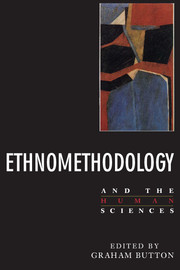Book contents
- Frontmatter
- Contents
- Contributors
- Preface
- 1 Introduction: ethnomethodology and the foundational respecification of the human sciences
- 2 Respecification: evidence for locally produced, naturally accountable phenomena of order, logic, reason, meaning, method, etc. in and as of the essential haecceity of immortal ordinary society (I) – an announcement of studies
- 3 Logic: ethnomethodology and the logic of language
- 4 Epistemology: professional scepticism
- 5 Method: measurement – ordinary and scientific measurement as ethnomethodological phenomena
- 6 Method: evidence and inference – evidence and inference for ethnomethodology
- 7 The social actor: social action in real time
- 8 Cognition: cognition in an ethnomethodological mode
- 9 Language and culture: the linguistic analysis of culture
- 10 Values and moral judgement: communicative praxis as moral order
- References
- Index
2 - Respecification: evidence for locally produced, naturally accountable phenomena of order, logic, reason, meaning, method, etc. in and as of the essential haecceity of immortal ordinary society (I) – an announcement of studies
Published online by Cambridge University Press: 05 June 2012
- Frontmatter
- Contents
- Contributors
- Preface
- 1 Introduction: ethnomethodology and the foundational respecification of the human sciences
- 2 Respecification: evidence for locally produced, naturally accountable phenomena of order, logic, reason, meaning, method, etc. in and as of the essential haecceity of immortal ordinary society (I) – an announcement of studies
- 3 Logic: ethnomethodology and the logic of language
- 4 Epistemology: professional scepticism
- 5 Method: measurement – ordinary and scientific measurement as ethnomethodological phenomena
- 6 Method: evidence and inference – evidence and inference for ethnomethodology
- 7 The social actor: social action in real time
- 8 Cognition: cognition in an ethnomethodological mode
- 9 Language and culture: the linguistic analysis of culture
- 10 Values and moral judgement: communicative praxis as moral order
- References
- Index
Summary
At a recent symposium of the American Sociological Association celebrating the 50th anniversary of the publication of The Structure of Social Action (Parsons, 1937), Jeffrey Alexander called attention to the book's continuing influence upon professional sociology. In the generosity of the celebration, he situated ethnomethodology's programme in the agenda of analytic sociology and offered ethnomethodology good advice.
From his place within the agenda, he identified for all ethnomethodologists the studies they do, advised them of studies they should do, and offered friendly advice about emphases they cannot avoid. In thoughtful reflections, he praised ethnomethodological studies for carrying on with the problem of social order that Parsons specified, and with which he instituted formal analytic sociology. In a spirit of generosity Alexander offered ethnomethodology an olive branch. Rather than pursuing their programme of current studies – which in another context he has criticised as ‘individualistic’ – ethnomethodologists should celebrate The Structure of Social Action by returning to the analytic fold.
I disagree. There are good reasons for ethnomethodological studies to specify the production and accountability of immortal, ordinary society – that miracle of familiar organisational things – as the local production and natural, reflexive accountability of the phenomena of order*. Among those reasons is making discoverable one of those phenomena of order*, but only one, namely what analysis incarnate in and as ordinary society, as practical action's locally and interactionally produced and witnessed embodied details, could adequately be.
- Type
- Chapter
- Information
- Ethnomethodology and the Human Sciences , pp. 10 - 19Publisher: Cambridge University PressPrint publication year: 1991
- 134
- Cited by

